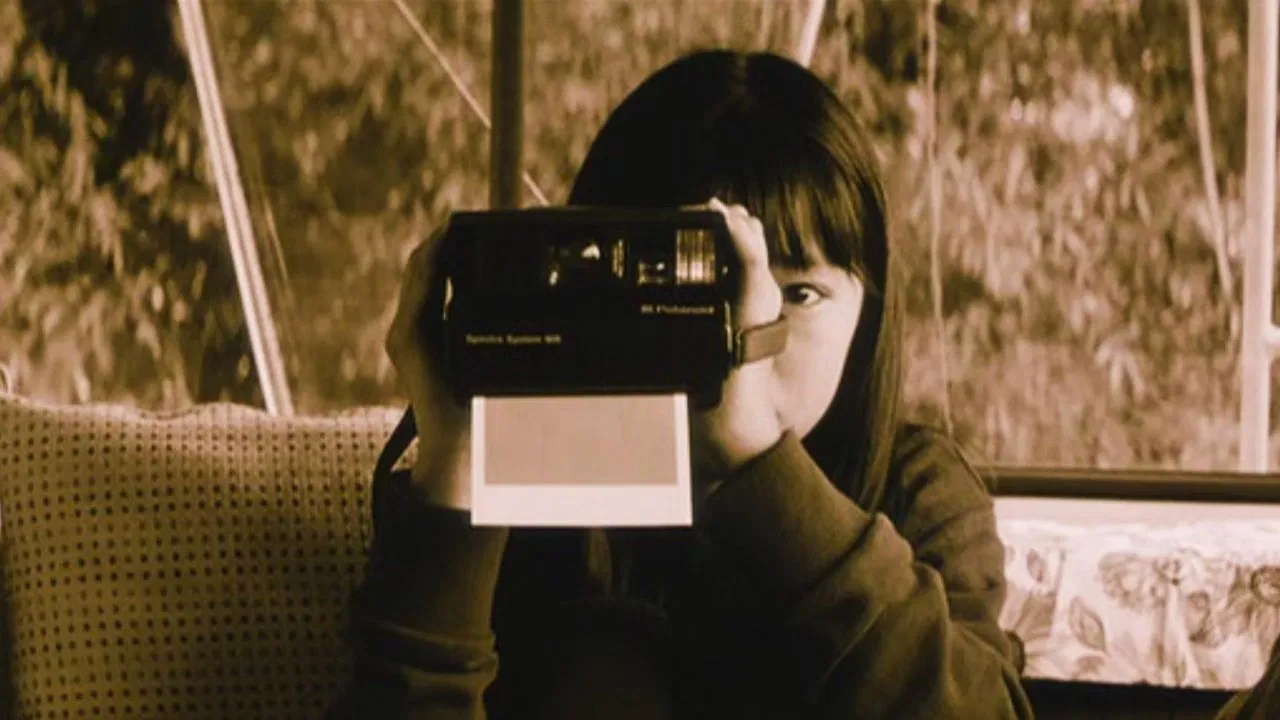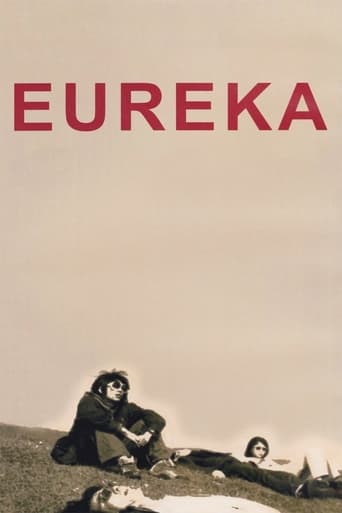



everything you have heard about this movie is true.
View MoreBrilliant and touching
an ambitious but ultimately ineffective debut endeavor.
View MoreI enjoyed watching this film and would recommend other to give it a try , (as I am) but this movie, although enjoyable to watch due to the better than average acting fails to add anything new to its storyline that is all too familiar to these types of movies.
View MoreIf, as Nigel said in Spinal Tap, there's a fine line between clever and stupid, then this movie shows that there's a fine line between artistic and tedious.For me this movie teetered on the edge for three hours before unfortunately toppling into the "tedious" pile. I think it was that awful, experimental noise music which was inserted at a most inappropriate time which killed it for me. But there were many other close calls which could have proved fatal as well.First let's talk about the colour. Just because a movie is shot in b&w doesn't mean that it is magically elevated to artistic status. On the contrary, I feel that (modern) b&w film must earn its right to be b&w. This movie failed in that department. There is no use of shadows, sharpness or contrast which are the primary appeals of the monochrome medium. Instead, the whole movie has a soupy, fuzzy, bleached appearance, like an old VCR tape that you left on the dashboard for too long.Obviously the director was trying to make a statement with this visually unappealing use of browns. If the movie were any shorter than 3.5 hours, then I could have forgiven it. But unfortunately it didn't make the cut.Next let's talk about theme. Sure, it has a compelling theme (sort of like the other Japanese film from the same year "Suicide Club") dealing with the contagious nature of evil. I do have to give this film applause for handling the subject much more poetically than the pop trash flick Suicide Club. Yet I have to turn around and fault the director for dragging the same message out for too long. The effect was a watering down of an otherwise powerful message. Again, we tip from magnificent to annoying.Lastly I'll mention some of the cinematic techniques and scene compositions. In a word: wow. There are a few shots which must've taken 100 takes to get them right, and with that I am impressed. But you have to realize that I am impressed simply as a film nerd who looks for that sort of thing. Beyond the gimmickery of a "wow" shot to impress the film nerds, I didn't see much poetic meaning to these indulgent scenes. Quite often they went nowhere. Unlike Tarr (Werckmeister harmóniák) or Bresson (Pickpocket) or even Hitchcock (Rope) who used long scenes to build momentum to a miniature climax each time, this director uses long scenes which ultimately lose coherence and end on a totally meaningless note. Another reviewer compared this film to Tarkovsky, and I have to say that's right on the mark; both directors share the same annoying tendency to film things that don't necessarily relate to the work but are simply neato things to do (like Tarkovsky's obsession with zooming in on peoples' earlobes for 2-3 minutes).I love Japanese cinema. I love the challenging philosophy of films like Rashômon, the poetic complexity of films like Shiki-Jitsu, and above all, the focused clarity of films like Warai No Daigaku. Japanese cinema is art with a backbone. Unfortunately this film lacks that backbone which has been the defining characteristic since the days of Kurosawa. Without it, the film becomes just another desultory, rambling, impressionistic soup.Unless you're a big fan of Tarkovsky, Paradjanov and other ambling Russian directors, I advise you to avoid this film. If, on the other hand, you like your films orchestrated and carefully designed à la Kurosawa, Orson Welles, Robert Bresson, or even the latter day greats Wim Wenders and Takeshi Kitano, then skip this and instead spend your 3.5 hours trying to hunt down a copy of Kwaidan by Kobayashi.
View MoreThere is an excellent 100-minute film in Eureka, but this monster is an exercise in tedium that will appeal only to a particular niche of film buffs. Other reviewers point out that this is mainly a visual experience, with movie tributes to the likes of Hou Hsiao-Hsien for the anoraks to delight in spotting. But nobody seems able to tell me WHY it is so long. There is one scene where the bus pulls out of a diner's car park, and drives up the road that extends into the distance, over the hill and out of sight. Fixed camera wide shot, no cuts. It takes 2 minutes 40 seconds - why? We know where the bus is going, and the frame is not particularly interesting to look at. Maybe there is a deeper meaning to such anti-editing statements that I am missing, but it looks like Aoyama just couldn't be bothered cutting the thing properly. Two stars for the cinematography.
View Morethe first thing i heard about this movie was that it would be a 3.5 hours long black and white movie with a minimum of dialogues. that was all i needed to know to impatiently anticipate seeing Eureka. it took a while and it only showed in three cinema's here in belgium, in one cinema each month for they had only one copy of the film, so when i heard it played i found myself lucky to finally see it with a showing rate of once a day only five days/week. a bit surprised but then again could've guessed not a lot of people where in the (very)small theatre. as for most movies i anxiously await i held my breath, but this one captured me from the start. ok, better said: after the first scene is over you get involved with the three survivors of the bus-jacking, the driver and two kids - who never speak again from that day on and seem to live on their own (no one seems to know what ever happened to their parents... which is great, i love certain things that aren't explained in the movies,). but now i give away more than i like when writing about movies (this thing about the parents isn't even that important to the story, hence the give-away of this detail) *also, note that i saw this movie in september 2001 and never found it again to see or buy (if anyone has it and wants to get rid of it...)* the film is split up in three major parts. the first describes the fall and 'resurrection' of the driver, the second focusses on the children and how the three meet up again and try to bring their lives back into balance, the last part takes you on a final road trip through the country in a bus turned camper as a final solution type of thing. the last seconds hold a nice little surprise! (k, not a big o' deal - allthough it has this particular distinct meaning,wich i found quite amusing! -and will b lost for 99% of the viewers- the meaning that is) i know the duration was a turn of for a lot of people and i guess i can understand why most find Eureka boooring, but people like that never ever see these things in their whole perspective. if this movie were to've been made more up-tempo'd, it would've lost it's charm toootally. stories like these won't be told just that easily, it has to be absorbed in it's entirety, so one can feel every emotion intended, also gives you a bit time to think about things as you see them unfold instead of afterwords when you have to recollect the whole movie (which i did anyway but hey) this is a must-see-movie when being a moviejunk (especially the anti-hollywood-cinemaniacs) are u an emotional type? with eyes for beauty? see it.
View MoreSome people have a disliking for Japanese cinema because the movies tend to be slow paced, minimalistic. If you're one of them - skip EUREKA is all you need to know. The movie moves along at a snail's pace on Sunday - at 90 minutes most movies are just coming to their explosive and or dramatic climax, but at that point I was still wondering what Eureka was about. 2 hours later the movie finally finishes - and I was still wondering what it was all about. EUREKA is a movie of epic length, that raises other challenging questions like "Why is it 3.5 hours long?", "Why is it black and white?", "Is this all going somewhere?" and "Is it nearly finished yet?". Clearly director Shinji Aoyama wants his movie to make us think. And in 3.5 hours of black and white imagery and minimal dialogue, your mind certainly does have ample opportunity to wander. Maybe I should have checked the "Director's Statement" that is included on the UK DVD before watching the movie. Then I'd have known what he was trying to say, and could have spent my time deciding if he said it effectively instead. Whether that would have been more fun or less I don't know though. Not to say that I didn't enjoy watching EUREKA - for most of the run time I did. It's very well acted, has some good cinematography and is generally quite unusual. I'd have preferred it to have been shorter though, or had more going on - even colour photography would have helped to keep my attention on the screen with a little less effort. I do think it's a good movie though, but... it just didn't need to be 3.5 hours to make its point or build its characters. Or maybe it did need 3.5 hours to do that, but Shinji Aoyama used his time badly - because at the end I still didn't really have a grasp on who the characters were 'deep down', or what the point of sharing their story with us was. Perhaps it's just that it's a movie aimed for better minds than mine to truly appreciate though. Certainly the length and style are going to keep any hopes of mainstream appreciation at bay.
View More